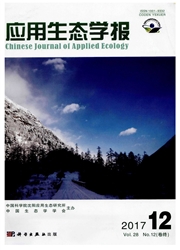

 中文摘要:
中文摘要:
采用常规生化实验方法,探讨了山楂叶螨在光、暗条件下经万寿菊根的氯仿提取物(TPC)作用后谷胱甘肽S-转移酶、蛋白酶活性及蛋白质含量.生物样品采用活体处理和离体处理相结合的方法.结果表明:万寿菊根氯仿提取物的光活化生物活性最高,其次为水提取物,最后为甲醇提取物;山楂叶螨经TPC处理后,谷胱甘肽S-转移酶和蛋白酶活性显著升高,蛋白质含量明显下降,蛋白酶及蛋白质含量变化程度在光照条件下显著高于黑暗处理.万寿菊根氯仿提取物中存在的活性物质,能够促进山楂叶螨离体酶液中蛋白酶的活化;TPC通过激活试螨体内的蛋白酶而促进蛋白质的降解.万寿菊次生物质的生物活性主要属于光活化活性.
 英文摘要:
英文摘要:
With in vivo and in vitro Tagetes erecta roots under light and dark as test materials, this paper studied the effects of their extracts on the glutathione S-transferase and protease activities and protein content in Tetranychus viennensis. The results showed that the chloroform extract of T. erecta roots had the highest light-activated activity, followed by water extract, and methanol extract. After treated with chloroform extract, the glutathione S-transferase and protease activities in T. viennensis increased markedly, while its protein content decreased obviously. The variation degree of T. viennensis protease activity and protein content was significantly higher when the chloroform extract came from the T. erecta roots under light, suggesting that there existed active matters in the extract, which could promote the activation of protease, and thus, the decomposition of protein in T. viennensis. The bioactivity of T. erecta metabolites was mainly of light-activated one.
 同期刊论文项目
同期刊论文项目
 同项目期刊论文
同项目期刊论文
 Acaricidal Activities of Extracts of Kochia scoparia against Tetranychus urticae, Tetranychus cinnab
Acaricidal Activities of Extracts of Kochia scoparia against Tetranychus urticae, Tetranychus cinnab Community structure and its dynamics of pests, predators and neutral insects in the jujube ecosystem
Community structure and its dynamics of pests, predators and neutral insects in the jujube ecosystem 期刊信息
期刊信息
